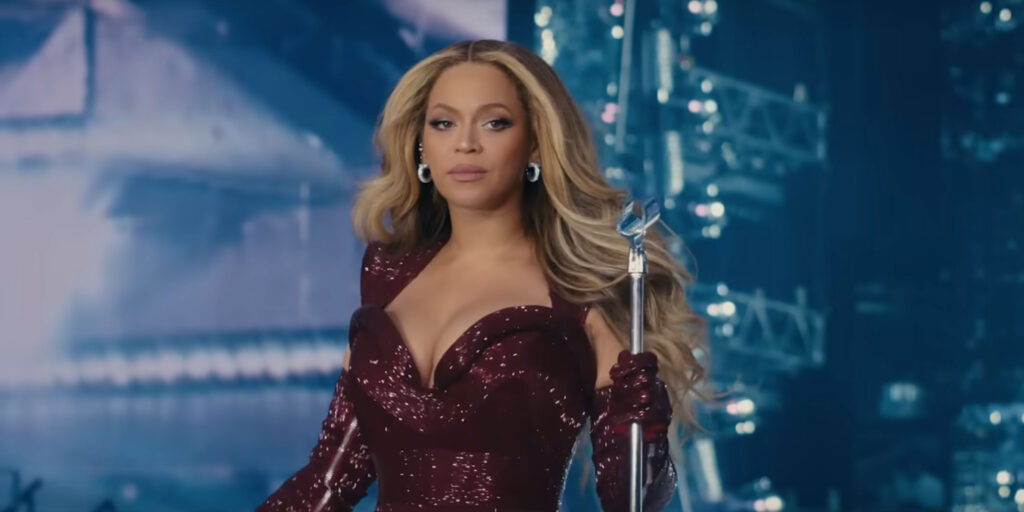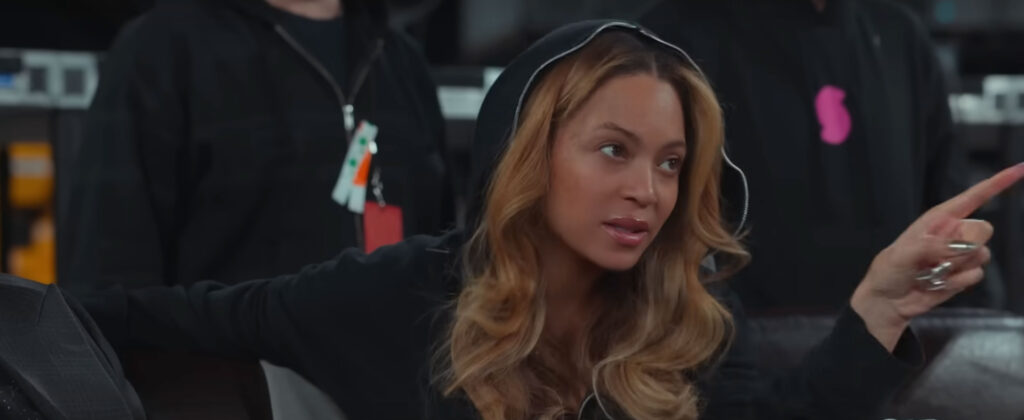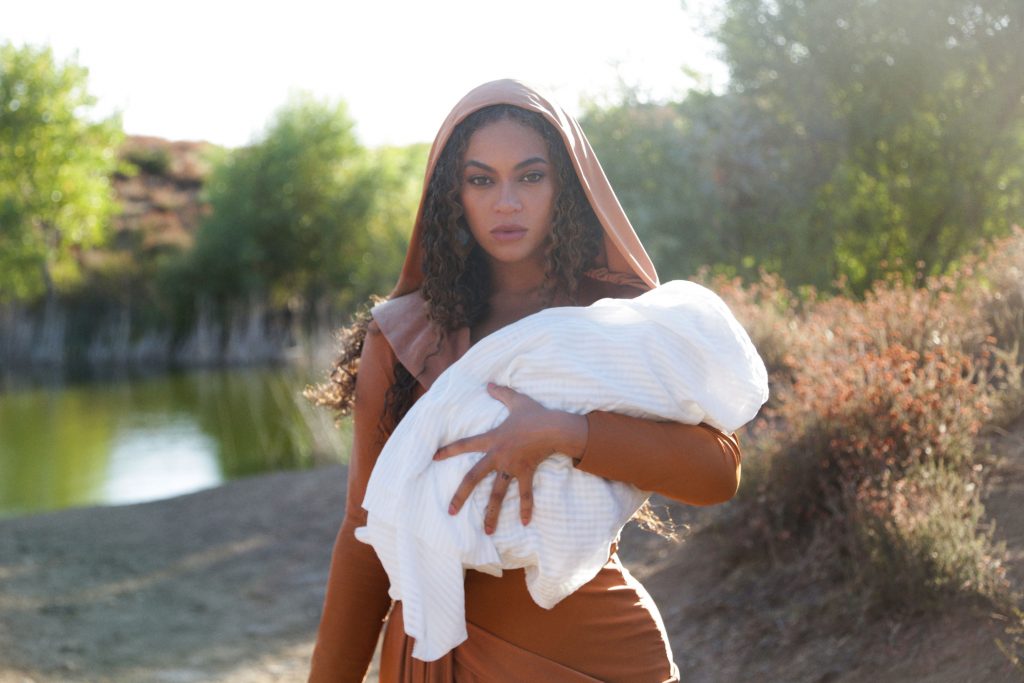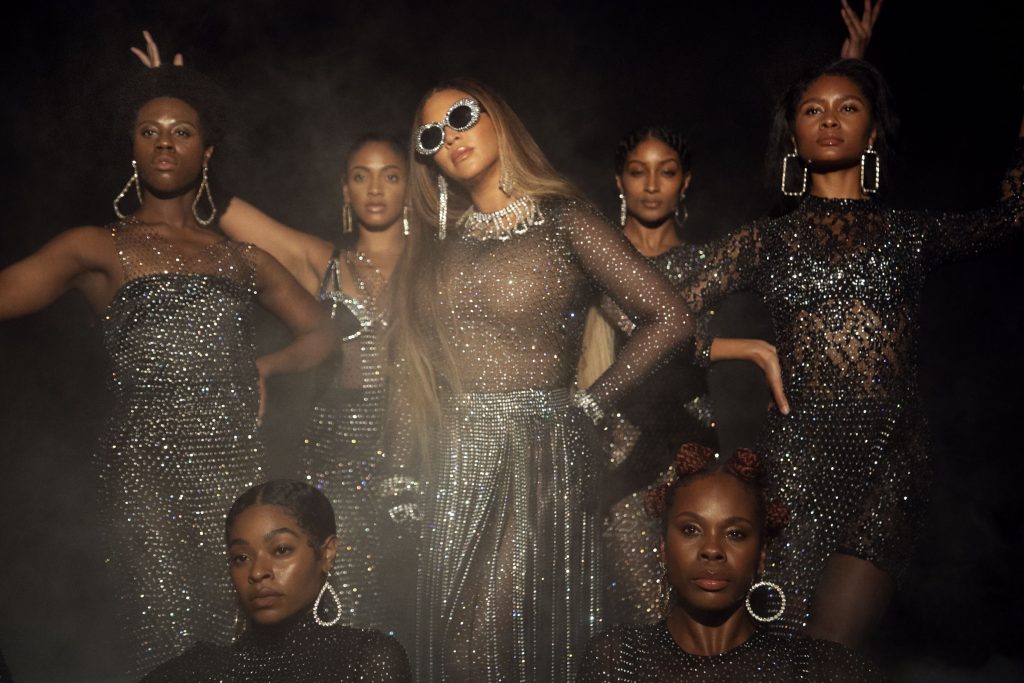December 9, 2023
by Carla Hay

“Renaissance: A Film by Beyoncé”
Directed by Ed Burke and Beyoncé
Culture Representation: Taking place in 2023, in various locations around the world, the documentary film “Renaissance: A Film by Beyoncé” features a racially diverse group of people who are connected in some way to Beyoncé’s “Renaissance” tour.
Culture Clash: Music superstar Beyoncé reflects on the obstacles and challenges she has faced in her life and addresses some of the criticism she has received.
Culture Audience: Besides appealing to the obvious target audience of Beyoncé fans, “Renaissance: A Film by Beyoncé” will appeal primarily to people who want to see a fairly comprehensive documentary of what Beyoncé was like during her mega-successful Renaissance Tour in 2023.

“Renaissance: A Film by Beyoncé” is a candid and immersive look at a superstar who wants to be both iconic and relatable. Beyond the glamorous stage show, Beyoncé reveals various sides of herself offstage, with gratitude to her influences and fans. The movie, which was filmed during Beyoncé’s 2023 “Renaissance” world tour of stadiums, could have easily been a pure vanity project. Instead, this is a “flaws and all” documentary that includes footage of what happened when a power outage on stage cause the sound to temporarily be unavailable during a concert.
Directed by Ed Burke and Beyoncé, “Renaissance: A Film by Beyoncé” is the type of celebrity documentary where many people seem to be very aware of the cameras being there, but nothing that’s shown off stage looks overly contrived or faked for the cameras. “Renaissance: A Film by Beyoncé” will get inevitable comparisons to the documentary “Taylor Swift: The Eras Tour,” which was released nearly two months earlier, in October 2023. Both documentaries were filmed during the artists’ respective blockbuster tours of 2023 and bypassed traditional movie distribution to be released in theaters by movie theater company AMC Theatres Distribution.
Whereas “Taylor Swift: The Eras Tour” is focused almost exclusively on Swift as a performer on stage, “Renaissance: A Film by Beyoncé” gives a much more personal view of Beyoncé in many aspects of her life. Beyoncé hasn’t done an interview in years, but she does a lot of voiceover commentary in the documentary, where she discusses her feelings about her life and her career. “Renaissance: A Film by Beyoncé” is the closest thing that fans will get to a Beyoncé public confessional in 2023.
Beyoncé’s Renaissance Tour (in support of her 2022 album “Renaissance”) was not a greatest-hits retrospective, such as Swift’s The Eras Tour. Much of the setlist on the Renaissance Tour consisted of songs from “Renaissance.” There is some nostalgia and archival footage in “Renaissance: A Film by Beyoncé,” but the tone of the film is very much a “here and now” portrait of Beyoncé in 2023. Just don’t expect to see anything gossipy or scandalous.
Many people who’ve never been to a Beyoncé concert wouldn’t be surprised that the documentary is filled with high-energy stage performances, dazzling costumes and stunning production design that includes video imagery inspired by Fritz Lang’s futuristic 1927 sci-fi classic “Metropolis.” (One of the Beyoncé’s more memorable stage costumes for the tour looks like a Beyoncé version of the Maschinenmensch robot in “Metropolis.”) Beyoncé struts and dances on stage, but she also has moments where she stands still (especially during power ballads) to channel the full impact of her emotion-filled delivery of a song.
Expect to see not only a lot of booty shaking in this movie but also cutting-edge artistry in the stage design and video projections. The choreography (by Fatima Robinson, who’s seen briefly in the movie) expertly showcases Beyoncé’s concert stage persona of being showbiz royalty at a dance party. Beyoncé says in the movie about the Renaissance Tour: “It took four years to create the show … This tour is a machine.” She says of the elaborate stage design: “You have people risking their lives to build this sculpture.” Beyoncé also talks about how she’s somewhat obsessed with how to use lighting in her work.
“Taylor Swift: The Eras Tour” kept the cameras focused almost entirely on Swift, but “Renaissance: A Film by Beyoncé” has a generous amount of screen time given to fans in the very diverse audiences who flocked to this “Renaissance” concert tour. One of those fans is actress Tracee Ellis Ross, whose mother Diana Ross (one of Beyoncé’s acknowledged influences) is also in the movie as a guest performer. Diana Ross leads the crowd in singing “Happy Birthday” to Beyoncé, who looks ecstatic and in awe that one of her idols is singing to her.
Other guests performers in the movie include Megan Thee Stallion (who looks just as starstruck by Beyoncé as Beyoncé looked starstruck by Diana Ross) for the hit “Savage” in Houston, as well as Kendrick Lamar for the remix of “America Has a Problem” during a Los Angeles concert. Beyoncé also pays tribute to Tina Turner (who died in May 2023) by doing a cover version of “River Deep Mountain High,” one of Turner’s best-known songs.
Several times in the movie, Beyoncé talks about being at a place in her life where she feels content and happy. Early on in the documentary, she says on stage: “I feel so full. My heart is full. My soul is full.” She adds, “I am so thankful. I’m so thankful to be alive. I’m so thankful to be on stage … I’m so thankful to be able to provide a safe space for y’all … I’m thankful that we all have the ability to make lemonade out of lemons.”
And although all of this sounds like a sentimental litany of thanks, there are plenty of moments (on stage and off stage) where Beyoncé lets loose with some occasional raw language of curse words. It’s all part of the personality and public image that Beyoncé puts forth to the world: She can be sweet, and she can be sassy. She is also comfortable expressing her sexuality without letting it overwhelm the reasons why people might be interested in her. As shown many times in the documentary, Beyoncé is aware of being seen as a “superwoman” by millions of admirers, but she’s also quick to remind people she has flaws and failings, just like everyone else.
“Renaissance: A Film by Beyoncé” is a movie where Beyoncé gives a lot of props and praise to other people, many who are featured in the documentary. They include her parents Mathew and Tina, whom she thanks for all of the sacrifices they made for her. Beyoncé’s family life with husband Jay-Z is shown in brief snippets backstage, on private planes, and on family vacations. Beyoncé and rapper/business mogul Jay-Z (real name: Shawn Carter)—who’ve been a couple since 2000 and married since 2008—have three children together: daughter Blue Ivy, born in 2012, followed by twins born in 2017: son Sir and daughter Rumi. Sir and Rumi are seen briefly in the documentary and are not interviewed on camera.
Many of Beyoncé’s backup dancers (called The Dolls) are shown commenting in the documentary, with transgender woman Honey Balenciaga and dance captain Amari Marshall as two of the standouts. Beyoncé’s massive entourage, tour staff and film crew also get respectful acknowledgement, although there are a few tense moments when a male member of the film crew dismisses Beyoncé’s knowledge of the cameras needed for certain shots. Even with all of her accomplishments and as a co-director of her own movie, Beyoncé experiences condescending prejudice.
Beyoncé comments frankly in the documentary that people communicate differently with her because she’s a black woman: “It’s always a fight … Eventually, they realize, ‘This bitch will not give up.’ If I’m honest, it’s exhausting. I’m a human, not a machine.”
Being emotionally strong in the midst of criticism and conflict is something that Beyoncé is teaching her children, although Sir and Rumi are deliberately not featured in the documentary as much as Blue Ivy is. Beyoncé’s mentorship of Blue Ivy is a significant part of the movie. Beyoncé talks about the difficult decision to let Blue Ivy perform on stage with her, after Blue Ivy begged her. Beyoncé was reluctant at first because she thought Blue Ivy was too young and because she didn’t want Blue Ivy to get hurt by the inevitable criticism.
The original intention was for Blue Ivy to do a guest appearance at one Beyoncé concert, but it turned into guest appearances at several concerts. Blue Ivy’s entry into the world of performing for stadium-sized crowds was well-received overall, but it didn’t come without harsh backlash from some people who think she has it too easy because of nepotism from rich and famous parents. Beyoncé says that the insults that Blue Ivy received for becoming a performer motivated Blue Ivy to work even harder on practicing, until it was obvious that she had the talent worthy of being on stage with Beyoncé. “She was ready to take back her power,” Beyoncé says of Blue Ivy’s determination to prove her haters wrong.
Beyoncé acknowledges that her children are very privileged, but it seems as if she doesn’t want them to grow up spoiled and disrespectful. There’s a backstage scene in the movie where Blue Ivy is very opinionated in saying on what songs should be in Beyoncé’s set list. Beyoncé politely but firmly tells Blue Ivy that she appreciates the input but “You need to take it down a notch.”
As for Beyoncé’s fans (nicknamed the Beyhive) and what she wanted to them to experience on this tour, she says in the documentary: “There are so many bees in this hive. It’s more than a concert. It’s a state of mind. It’s a culture. It’s a fantasy come true.” Many of the fans wore silver on the tour, as a tribute to Beyoncé wearing silver on the cover of the “Renaissance” album. Beyoncé is on a silver horse statue on the album cover, and part of the tour’s concerts included her on a silver horse statue.
Even with any fantasy elements, Beyoncé repeatedly says in the documentary that she wants all of her concerts and her work environment to be places where people can be “real” and be themselves. As a testament to what type of inclusve and understanding boss that Beyoncé is, trumpet player Crystal Torres says she was somewhat nervous to let people know before the tour started that she would be very pregnant on the tour. According to Torres, Beyoncé encouraged Torres to be proud of her pregnancy while performing. The documentary has footage of Torres on stage wearing outfits that expose her pregnant belly.
A significant part of the documentary is devoted to the LGBTQ+ people who have influenced Beyoncé or made a difference in her life in some way. The queer/transgender ballroom culture (including “voguing” as a form of dance) is celebrated on stage and off stage on the tour. Ballroom pioneer Kevin JZ Prodigy gets his due respect as a icon on the tour. Beyoncé and her mother Tina also express immense gratitude to Johnny Rittenhouse Jr. (nicknamed Uncle Johnny), an openly gay close friend of the family who designed many of Beyoncé’s stage clothes early in her career. Rittenhouse died of AIDS-related complications in 1998.
There’s also footage of Beyoncé returning to her childhood hometown of Houston, which she calls a “gumbo of black cultures.” During a ride on a private plane, Beyoncé looks out a window and points to the parking lot of a shopping mall where she used to perform before she was famous. It’s a moment where she seems to be reflecting on all the hard work it took to get to where she is now, but she still remains humble and grateful.
Another “past meets the present” moment is some quick footage of Beyoncé reuniting backstage in the same room with former Destiny’s Child group mates Kelly Rowland, Michelle Williams, LaTavia Roberson and LeToya Luckett. They are shown giving each other emotional hugs. Roberson and Luckett exited Destiny’s Child in the 2000, under contentious circumstances, but that feuding has clearly been put behind them and resolved. (Destiny’s Child was formed in 1990 and disbanded in 2006.)
“Renaissance: A Film by Beyoncé” has some great film editing that shows Beyoncé performing a song but with quick-cutting edits of her wearing different outfits at different concerts’ performances of the same song. It’s difficult to do these types of edits, because body movements must be precisely matched, in order for the edits to look seamless. The movie’s cinematography is also done very well.
The documentary is a visual treat but it’s also admirable in showing what happens when there’s a big technical glitch during a concert. While Beyoncé was performing “Cozy,” the sound abruptly was cut off because of an unexpected power outage. Many artists would have had a temper tantrum or panicked, but Beyoncé briefly halted the concert in a composed manner and quickly went backstage to find out what could be about the audio problem, which was eventually corrected when the power came back. She handled everything like a true professional.
Beyoncé also shows a vulnerable side when she talks about the physical injuries that affected her career. When she was a teenager, strenuous singing for hours in a recording studio caused her to have a vocal injury where she was under medical orders not to speak for several weeks. She also had knee surgery in 2023. Some of her medical treatment and recovery from the knee surgery are shown in the documentary.
Toward the end of the movie, Beyoncé talks about the many sides to herself. She says that being a wife and mother is the core of who she is. Being a determined business person is a side of her that’s been influenced by her father, who was her manager during her time with Destiny’s Child and in her early solo career. And being a performer is the confident side to her. “I’m not responsible for that person,” she says jokingly about being a performer. “Renaissance: A Film by Beyoncé” presents all these sides to her in ways that seem to be authentic but still leaves enough mystery about Beyoncé to preserve her privacy and dignity.
AMC Theatres Distribution released “Renaissance: A Film by Beyoncé” in U.S. cinemas on December 1, 2023.


